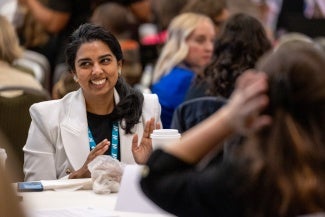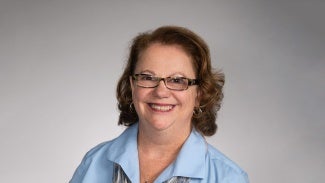
Why should women in the AEC industry attend WLS?
A construction manager tells us why she's attending this year's Women's Leadership Summit for the first time.

Laura Pager is the president of Gale Construction Company, a Joliet, Ill.-based contracting firm that has worked on projects for the U.S. Army Corps of Engineers, the Department of Agriculture, and more.
Pager, who has been in the industry for 27 years and enjoys sailing and gardening in her free time, will be attending AIA’s Women’s Leadership Summit for the first time this year. WLS is the industry’s premier event dedicated to accelerating women into leadership positions in architecture, design, and the allied building industries, and will be held in Chicago from October 8-10. We asked Pager about why she’s attending and what she hopes to gain from the experience.
How did you get your start in the AEC industry?
I had been working in finance – stocks and bonds – at a regional brokerage firm. My high school friend, Mike Gale, had gone right into the trades after school while I went away to college. He had been a sole proprietor for a little while, and then he went back to work with his tools. He wanted to go back into business, but the problem was that he’s a worker bee; he’s a tool guy. He’s a tradesman and he’s not prone to reading specifications, dealing with banks, that kind of thing. So, we went into business together, and that’s how it happened.
Our very first job was in 1996. It was a $26,000 retaining wall we did for the village of Des Plaines [Illinois]. It was actually on one of their larger creeks, and it was a timber retaining wall up against somebody’s residential property. That was our first municipal construction project. Prior to that, we were doing driveways and patios – residential work. We got a request for proposals from the village, and we said, ‘Well, I don’t know. How hard can that be?’ We started talking about it around January, and then we were doing our first job by April.
After that, we started working with the Illinois Department of Natural Resources and then hopped up to doing bigger projects.
What was the revenue of that first job compared with where your company is now?
The first year, if we broke $50,000, that would have been fantastic. Now, we’re doing about $15 million in revenue.
What is your favorite part about being in this industry?
Oh, my gosh. I would say the variety in my day and the variety in the kind of jobs that I have. We self-perform civil work, but then we’re general contractors for projects that have a lot of moving parts, like a GSA project that may have glazing on windows and bollards outside. You’ve got milestones on your schedule, you’ve got deliveries coming in. Every single day and every single job is different, and I appreciate that variety.
Was there a mentor who particularly impacted your career?
There really wasn’t, and I guess that’s unusual. I have become a mentor to a few people. When I started back in the late nineties, there weren’t that many [women]. I just kind of did it on my own. We [the company] were a little island.
I was very much a worker bee from around 1996 until the early 2000’s, when I joined the Federation of Women Contractors and [Gale Construction] started doing more municipal work. I had not even realized there were organizations out there that could help my business. I didn’t even certify right away, until around 2005 or ‘06. I didn’t even know anything about certifications – we were just working.
What are some specific challenges you’ve identified for women in this industry?
I’ve had incidents where my male counterparts [at] firms, through their insurance agents, were able to have a meeting with their underwriters for better and more bonding. I asked for those same meetings from my insurance agent, and I was denied. There have been some challenges that way. It’s been a tough slog sometimes. To this day, it sometimes happens that I’m the only woman at a pre-bid. Often, we are finding that there are more women project managers at the Army Corps of Engineers. There are more women that are doing some of the civil work from the architecture and engineering side of things, and I see them at meetings more [often]. But for the first 10 years, it was often just me with our boots on the ground out there, in the middle of Iowa, looking for jobs.
This will be your first year attending WLS. What do you most hope to gain from attending?
I’ll be interested to see what the mix of actual construction company, boots-on-the-ground [presence is] versus more of the designer, architect, engineering end of things. So, I’ll be interested in that mix.
What are you most excited about?
I think just meeting other women that are in the business. I am a director of the Federation of Women Contractors, but there’s just not enough of us. I’d like to meet more.
What are some ways that women in AEC can improve how they work together?
In the last year or so, I will say that I have met a few other women who are in business development at their construction firms. I have a female counterpart who owns a service-disabled, veteran-owned small business. We are partnering now on jobs, and I would like to see more of that. I’m looking forward to being able to meet [more] people where I can do that kind of thing. That’s one area – actually partnering or doing formal team agreements with other women-owned firms and women in the business, to find more partnerships where you can control the entire project and the process.
If you're interested in joining Laura Gale at WLS in Chicago from October 8-10, there's still time to register here.
